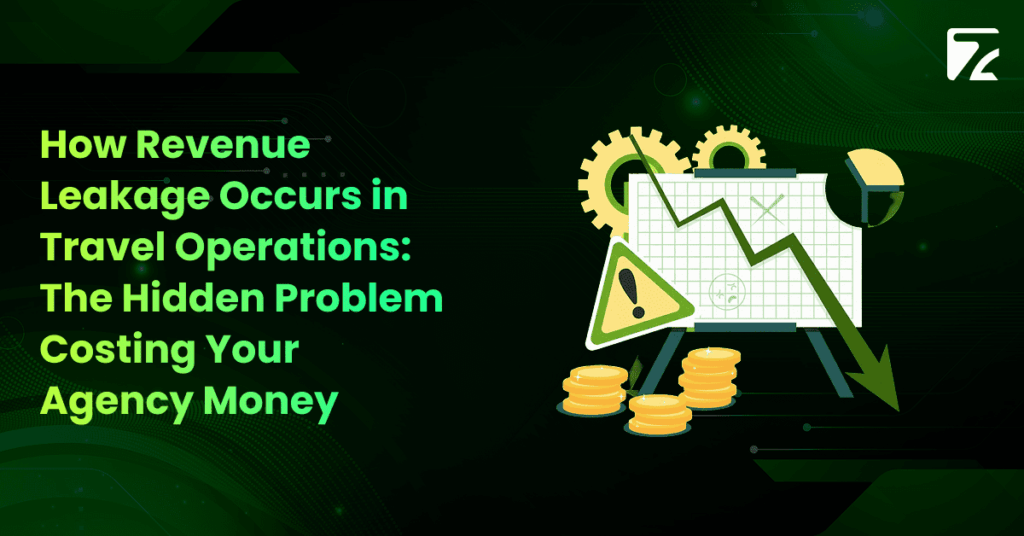How Revenue Leakage Occurs in Travel Operations: The Hidden Problem Costing Your Agency Money

How Revenue Leakage Occurs in Travel Operations: The Hidden Problem Costing Your Agency Money Revenue leakage is the revenue your travel agency should be collecting but doesn’t because it never gets collected. It’s as if there are holes in your bucket, and so no matter how much water you put in, some always flows out. As a travel agency where margins are slim, usually anywhere from 10-20%, a dollar lost is a direct dollar off to your bottom line. Four in five executives view revenue leakage as a chronic problem, with 45 percent saying it’s systemic for their companies, according to Boston Consulting Group. In the travel world, the problem is even more complicated because agencies work with several suppliers, complex commission schemas, and countless booking channels. So, let’s dive into how and why revenue leakage occurs in travel operations and what you can do to prevent it. What is Revenue Leakage in Travel Operations? Travel revenue leakage is money you’ve earned but not received because of operational issues, technology problems, or human error. Instead of being a victim of tourism leakage, where tourist dollars go to foreign firms, you become a victim of your own company in the case of operational revenue leakage. If you booked a $5,000 vacation package for a client and are supposed to make a $500 commission but receive a $400 commission as a result of tracking glitches, you just lost $100 to revenue leakage. Multiply that over hundreds of bookings, and the losses can add up fast. The Main Ways Revenue Leakage Occurs in Travel Agencies 1. Commission Tracking and Collection Problems Commission tracking is one of the largest revenue sources of leakage for most agencies and is 70-80% agency revenue in most cases. According to Onyx Center Source research, supplier commission tracking discrepancies have agencies losing between $5,000-$50,000 a month in revenue. Missing Commission Payments The most common problem for agencies is non-payment of commissions. Industry records indicate more than 40% of commissions have errors or are never paid. This occurs through several mechanisms: Hotels not paying for 60-90 days after guest checks out. Suppliers altering commission structures with inadequate communication No Show and Cancellation impact on commission calculation Commission statements containing unnoticed errors Commission Structure Revenue Leakage Patterns Modern commission systems are so difficult that systematic revenue leakage occurs for the majority of agencies, and they don’t even know it. Today the majority of large hotel chains have implemented 3-4 tier commission models based on annual volume of sales. A typical structure might include: Tier 1: $0-$250K sales annually = 8% Tier 2: $250K-$500K annual sales = 10% commission. Tier 3: $500,001 – $1M In annual sales = 12% commission Tier 4: $1M+ per year in sales = 14% commission + 2% override Agencies frequently miss out on thousands in payments because they fail to track precisely when they surpass thresholds. If you actually attain Tier 3 in July but do not inform the vendor, you will continue to be paid Tier 2 prices through the end of the calendar year. Seasonal and Product-Specific Variations Suppliers often change their commission rates seasonally or by product category, which agencies often overlook. Summer cruise commissions rise to 12-15% from the regular 10%, and European hotel chains pay 2-3% bonus commissions during shoulder seasons. In many cases the same supplier is paying different commissions for different products which results in tracking nightmares such as hotel room-only bookings paying 10% standard commission whereas hotel plus package deals are paying 12%. Real Financial Impact For example, imagine that you are a mid-size agency with annual sales of $2M. In traditional commission tracking, they could make $200K annually in commission income. But with optimal structure commission tracking they could have harvested revenues of $260K per year. That’s $60,000 of pure profit that the agency lost money it made but never saw thanks to poor commission structure management. 2. Booking Leakage Fox World Travel states that 37% of hotel bookings and 15% of flights are booked outside corporate channels on average, likely leading to booking leakage. For travel companies, it has translated into lost commissionable revenue when customers bypass agencies and book directly with suppliers. The Corporate Travel Challenge According to a recent Christopherson survey of 100 travel managers, fewer than half guessed that they had travel leakage at 10 percent or less. The main impacts include: Loss of negotiated and discount rates Scattered travel data and the difficulty of tracking expenses Inadequate visibility for care and emergency duty You’re leaving volume-based commission levels on the tab 3. Operational and System Failures Service fees are pure profit for travel agencies no cost of goods, no supplier dependency, strictly revenue. But recruitment firms lose 20-30% of potential service fee revenue to under-collection behavior. Study finds that 67% of agencies fail to include service fees on complex itineraries, 45% don’t charge fees on booking changes or modifications. Only a meagre 23% of serviced apartments currently have automated service fee application systems with substantial profit leakage. Common Service Fee Leakage Scenarios The largest gaps come in consultation fees never submitted. Lots of agencies do it for hours and never end up billing for it: About 2-4 hours of destination research and planning @ $75/hour = $150-300 disappeared Complicated itinerary planning: 4-8 hours @ $75/hour = $300-600 spent. Multiple rounds of changes: 1-3 hours @ $75/hour = $75-225 wasted Transaction charges are equally arbitrary. Thus, a fee of $25-50 for booking an airline ticket may be waived and a fee of $15-25 for making a hotel reservation may be ignored. The processing of change and cancellations is another huge gap, where costs are taken by the agencies versus charging clients. Financial Impact Analysis For a typical agency with 500 bookings a year, the standard service fee total should be $37,500. The reality is, however, under-performing collection systems collect only $26,250, resulting in annual revenue leakage of $11,250. That’s pure profit loss, since service fees fall directly to the agency’s bottom line. GDS
